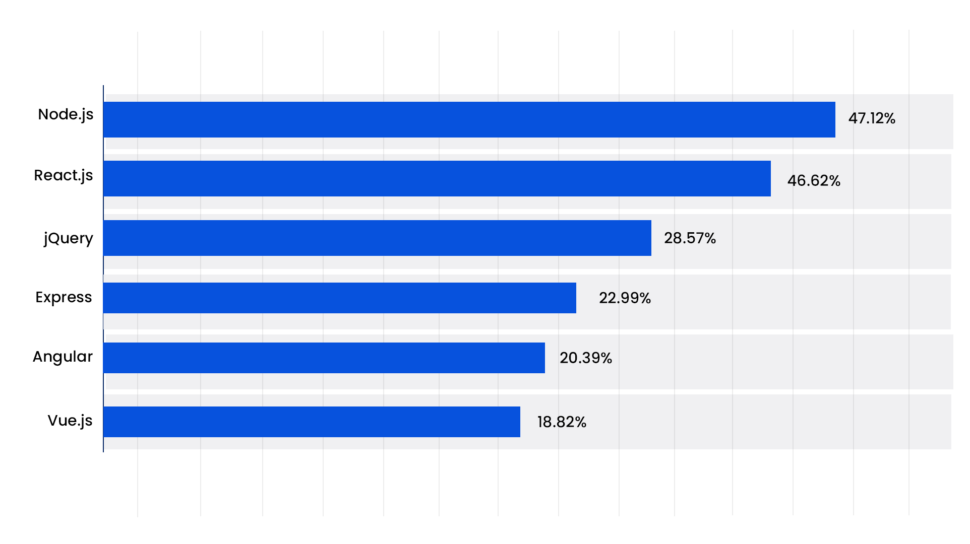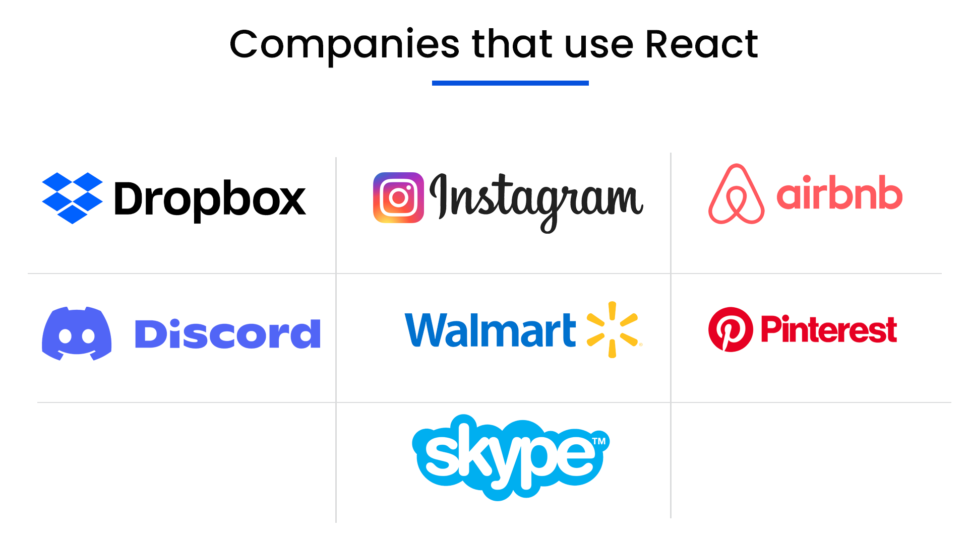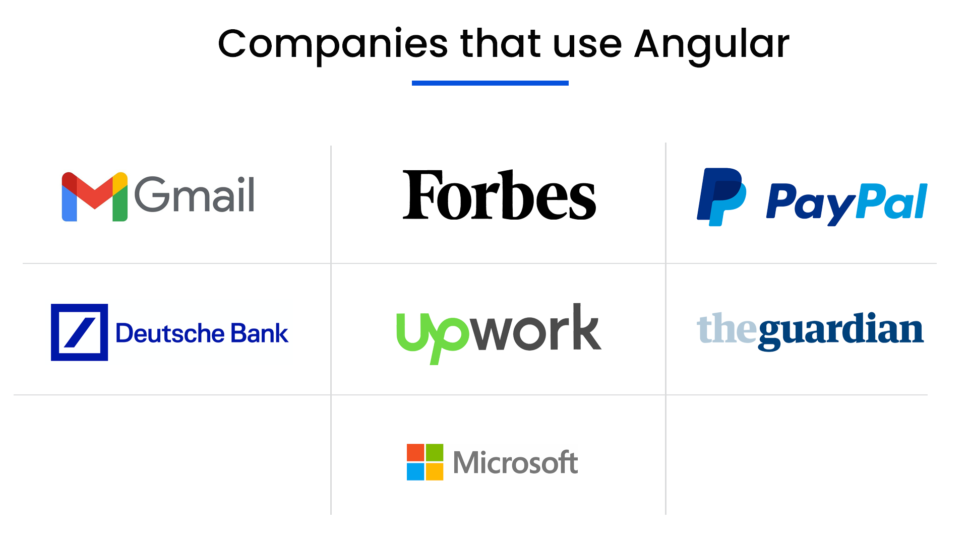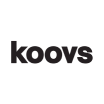The ongoing debate between React and Angular has continued for several years, as both have established themselves as leading frameworks for building scalable, reliable, and high-performance applications. These open-source libraries have gained importance in recent years, showcasing strong features and extensive development.
Selecting the right framework for a project can be a formidable task, given that each comes with its own set of strengths and weaknesses. Angular and React, both being powerful frameworks/libraries, offer a diverse range of capabilities, making it essential to understand the advantages of each.
Statista’s data reveals the most widely used web frameworks among developers:

Examining the popularity of Angular versus React, both frameworks enjoy significant prominence. React commands a substantial market share at 42.62%, while Angular holds a notable position with a 20.39% market share. At Ailoitte, we have extensive experience working with both tools and in this blog post, we aim to provide insights into the comparison between React and Angular.
First, let us see React vs Angular as a Frontend Framework.
React vs. Angular as a Frontend Framework
Both Angular and React serve as frontend frameworks, but they differ in their approach. Angular is a comprehensive framework, offering plenty of built-in features and tools, although with the requirement of adhering to more conventions for optimal code functionality. Both frameworks are open-source, freely available, and enjoy support from substantial developer communities.
On the other hand, React is a lightweight framework. While it may not give as many features as Angular, it provides greater flexibility in code structure. Another significant distinction lies in their licensing models. Angular operates under the MIT license, while React is licensed under Facebook. Consequently, developers must align their code with the respective standards associated with each framework.
Difference between iOS and Android app development: What to choose for Web App
Firstly, let’s have an understanding of React—its advantages and the theory behind choosing React over Angular.
What is React?
React stands as an open-source JavaScript library renowned for its component-based and declarative characteristics, empowering developers to effortlessly construct interactive and sophisticated user interfaces. The simplicity of coding enables the creation of fast and scalable applications across various platforms.
Utilizing JSX, a variant of XML syntax, React streamlines the development process. Its widespread adoption is attributed to the Virtual DOM, a feature that accelerates code updates and ensures optimal performance.
Benefits of React for Web App Development
React has many benefits that help it stand out among other front-end frameworks.
Reusable Components:
React facilitates time-saving for developers by enabling the reuse of components. This eliminates the need to rewrite code to implement identical features, and adjustments to a specific area do not affect other app components.
Large Community Support:
With a substantial and active community, developers have access to a wealth of expertise. The continuous creation of new tools and solutions ensures that issues can be addressed promptly. React boasts over 199,000 users on GitHub and sees more than 15 million weekly downloads on npm.
Simple and Easy to Use:
React simplifies the process of creating both simple and complex user interfaces using HTML and JavaScript components. The virtual DOM feature enhances app loading speed, and dynamic changes to user interface elements occur seamlessly without requiring a page refresh. This makes React particularly advantageous for developing front-end web applications that demand swift loading times.
Virtual DOM:
The virtual DOM functions as a replica of the actual DOM, assessing and identifying the elements that need to be modified swiftly in response to user requests. This mechanism significantly reduces processing time, contributing to faster app loading times and improved responsiveness.
Recommended Section: What is React Native: A comprehensive guide for app entrepreneurs
Why Should You Choose to React over Angular?
React is considered superior to other front-end frameworks for several reasons. The following is what React is used for.
- Given that React follows a component-based architecture, emphasis on code reusability and modularity is heightened, contributing to the swift development of sophisticated user interfaces. React’s compatibility with existing projects and codebases makes it a versatile choice. Additionally, React’s declarative nature simplifies code readability and comprehension compared to some other frameworks.
- In terms of performance, React outshines in the React vs. Angular comparison, thanks to its implementation of a virtual DOM and rendering optimization techniques. The adoption of an open-source model further strengthens React’s appeal, with a robust community providing extensive support. This active community not only contributes to the continuous improvement of React but also plays a pivotal role in assisting and enhancing the overall user experience with the technology.
Ultimately, the decision to choose React or Angular depends on factors such as project requirements, team expertise, and individual preferences. React is often favored for its flexibility, performance, and community support.
Companies that use React
Cross-platform apps have many benefits; the following are some top companies worldwide that use React.

I. Dropbox:
The online backup and cloud storage application utilized the React Native framework, along with React JS and other debugging tools in its development.
II. Instagram:
The well-known photo and video-sharing social networking app employed React JS and React developer tools for its platform.
III. Airbnb:
The global provider of tourism and hospitality services utilized React to enhance communication and streamline search functions on its platform.
IV. Discord:
As a voice and chat program for gamers, Discord leveraged React for features such as multi-server support, rich UI, self-hosting facilities, and improved moderation tools.
V. Walmart:
The largest superstore in the USA enhanced user experience by implementing the React Native framework and libraries in both its web and mobile applications.
VI. Pinterest:
The personalized social media platform adopted ReactJS as the primary technology stack for its web application.
VII. Skype:
The widely-used voice-over-internet-protocol (VoIP) application utilized React Native for its mobile app, providing a user interface reminiscent of the desktop version
What is Angular
Angular is an open-source web application framework developed by Google. Introduced in 2016, Angular is designed to simplify and streamline the process of building dynamic, single-page web applications. It is built using TypeScript, a superset of JavaScript, and provides a comprehensive set of tools and libraries.
Angular follows a component-based architecture, allowing developers to build modular and reusable components for constructing user interfaces. It offers a range of features such as two-way data binding, dependency injection, and a robust templating system. It is known for its scalability and is suitable for projects of varying sizes, from small applications to large enterprise-level solutions.
With a vibrant and active community, Angular receives continuous support and enhancements. Its ecosystem includes various tools and extensions that contribute to efficient and structured web development.
Benefits of Angular for Web App Development
Angular distinguishes itself through the following factors:
I. Google Support
Angular receives regular updates and improvements, with Google’s development teams consistently releasing revised versions. This ongoing support from Google and the active Angular community facilitates efficient development, particularly for complex projects.
II. Architecture
Departing from the traditional MVC (Model View Controller) architecture, Angular allows developers to order separate components based on their functionality. This enables the division of an application into distinct components that can be easily integrated, facilitating seamless testing of web-based applications.
III. Comprehensive Documentation
Google provides extensive documentation for Angular, ensuring that developers can readily access all the technical information they need during the development and maintenance of applications. This comprehensive documentation contributes to lower development and maintenance costs.
Why Should You choose Angular over React?
We’ve explored numerous advantages of utilizing Angular in app development. Angular, being a comprehensive framework, provides all the essential components for building a mobile app, eliminating the need for additional libraries. Here are some specific use cases where Angular excels:
- Angular’s support for TypeScript in app development is a significant factor. This support allows the creation of more maintainable code and facilitates the early detection of mistakes. Moreover, the learning curve for Angular is made more accessible due to the abundance of tools, official documentation, third-party libraries, and online courses available for developers.
- Angular benefits from a thriving community and substantial support from Google, ensuring ongoing improvement and long-term maintenance of the framework.
- Angular is well-suited for diverse applications, including the development of single-page web apps, offline applications like Progressive Web Apps (PWAs), applications featuring compelling graphics and animations, e-commerce platforms, and enterprise-level applications.
Coming to which type of web applications are more suitable for Angular, it can be perfect for building simple web apps, e-commerce, and enterprise apps, Server-Side Rendered (SSR) apps, mobile apps with stunning interfaces and animations, progressive web apps that work offline, travel and social apps and many more.
Top Global Companies Leveraging Angular
Here is a list of prominent companies worldwide that have incorporated Angular into their technology stack:

I. Gmail:
Google’s email service employs the extensive capabilities of Angular to manage heavy traffic efficiently.
II. Forbes:
The globally esteemed publication relies on Angular for the development of a high-performance and responsive website.
III. PayPal:
The world’s trusted online payment company utilizes the AngularJS framework to ensure safe and secure real-time transactions.
IV. Deutsche Bank:
The German fintech giant integrates AngularJS for the front page of its portal, contributing to a user-friendly interface.
V. UpWork:
The freelancing platform incorporates Angular for features like in-app calling and a robust payment gateway, enhancing the performance of its website and app.
VI. The Guardian:
This leading UK-based newspaper leverages AngularJS to create an accessible and user-friendly web app that reaches millions of readers.
VII. Microsoft:
The hardware and software giant applies Angular for its Office 365 web application and the Microsoft Office suite, ensuring a seamless user experience
Differences Between Angular and React
Below is a summary table outlining the key distinctions between Angular and React that you should be aware of:
| Parameter | Angular | React |
| Type | Framework | Library |
| Developer | ||
| Architecture | MVC | Component-based |
| UI Components | Built-in Material Design toolset | External Material-UI Library & Dependencies |
| Dependency Injection | Supported | Not supported |
| Language | TypeScript | JavaScript |
| DOM | Real DOM | Virtual DOM |
| Compatibility | Updates must be installed | Fully compatible |
| Data Binding | Bi-Directional (Data is mutable) | Uni-directional(Data is immutable) |
| Learning Curve | High | Low |
| Abstraction | Strong | Medium |
Click here to find the Checklist for What to do after Mobile App Launch
Angular vs React – How to choose between them
To determine the most suitable language for your development project, it is essential to consider the following aspects:
I. Feature Suitability:
Evaluate whether the framework offers all the necessary features required for the project. This ensures that the chosen technology aligns with the project’s specific needs and goals.
II. Programming Languages:
Understand the coding languages used by each framework. This insight helps in assessing compatibility with existing codebases and the availability of developers proficient in those languages.
III. Ecological Adaptability:
Examine how adaptable the ecosystem of each framework is to different project requirements. A flexible and robust ecosystem can enhance development efficiency and accommodate evolving project needs.
IV. Developer Experience:
Consider whether the developers involved in the project have prior experience working with the selected framework. Familiarity with the chosen technology can contribute to smoother development processes and better outcomes.
V. Learning Curve:
Evaluate how easily the development team can learn and work with the framework. A framework with a manageable learning curve can expedite the onboarding process and minimize potential challenges during development.
Our Verdict
To facilitate your decision-making process, we’ve compiled a comprehensive comparison guide for Angular vs. React. The choice of the technology stack for your web application is crucial, considering factors such as project specifications, the development team, budget constraints, and the experience of the Angular and React web app development companies. Careful evaluation of these aspects is essential before embarking on your project.
While both Angular and React can address various challenges, the decision ultimately hinges on personal preferences. Each framework has its unique methodologies, and the choice depends on the specific needs of your web application. The robustness and activity of the community surrounding each framework play a significant role in swiftly resolving unexpected issues.If you are uncertain and need professional advice, consider reaching out to a reputable mobile app development company like Ailoitte. Our team has extensive experience crafting custom apps using both Angular and React. Given that each framework has its merits and limitations, we can assist you in selecting the right framework for your project, ensuring a cost-effective and scalable application that meets both your and your users’ needs. Contact us today for a consultation on the most suitable tech stack for your project.
FAQ
React is better and more popular than Angular owing to rendering optimization and better app stability, and it can be integrated into any project as a library.
Some popular companies using Angular are Microsoft Office, Deutsche Bank, Forbes, PayPal, Upwork, Gmail, Google, and Amazon.
You can use Angular to design web apps for all kinds of environments. You can design minimalist but highly dynamic apps with the help of a wide variety of libraries, thus saving a lot of time during the project development.
React is a JavaScript library used for building user interfaces and UI components.
JavaScript is a popular programming language for web applications, whereas TypeScript is an OOP language based on JavaScript.
Angular is an integral component of the MEAN stack and boasts excellent compatibility with various code editors. It is particularly well-suited for the development of dynamic websites and web applications. In contrast, React is extensively utilized for crafting reusable HTML elements in the realm of front-end development.
React is a JavaScript library, whereas Angular is a front-end framework. React uses one-way data binding and virtual DOM, whereas Angular uses two-way data binding and real DOM. Moreover, React is faster than Angular as it has a smaller bundle size.
React is simple to use and provides developers with various options for performing similar tasks. In comparison to Angular, React is faster and easier to learn. React also features a unidirectional data flow and is less than Angular.


















.png)
.png)
.png)



Leave a Comment